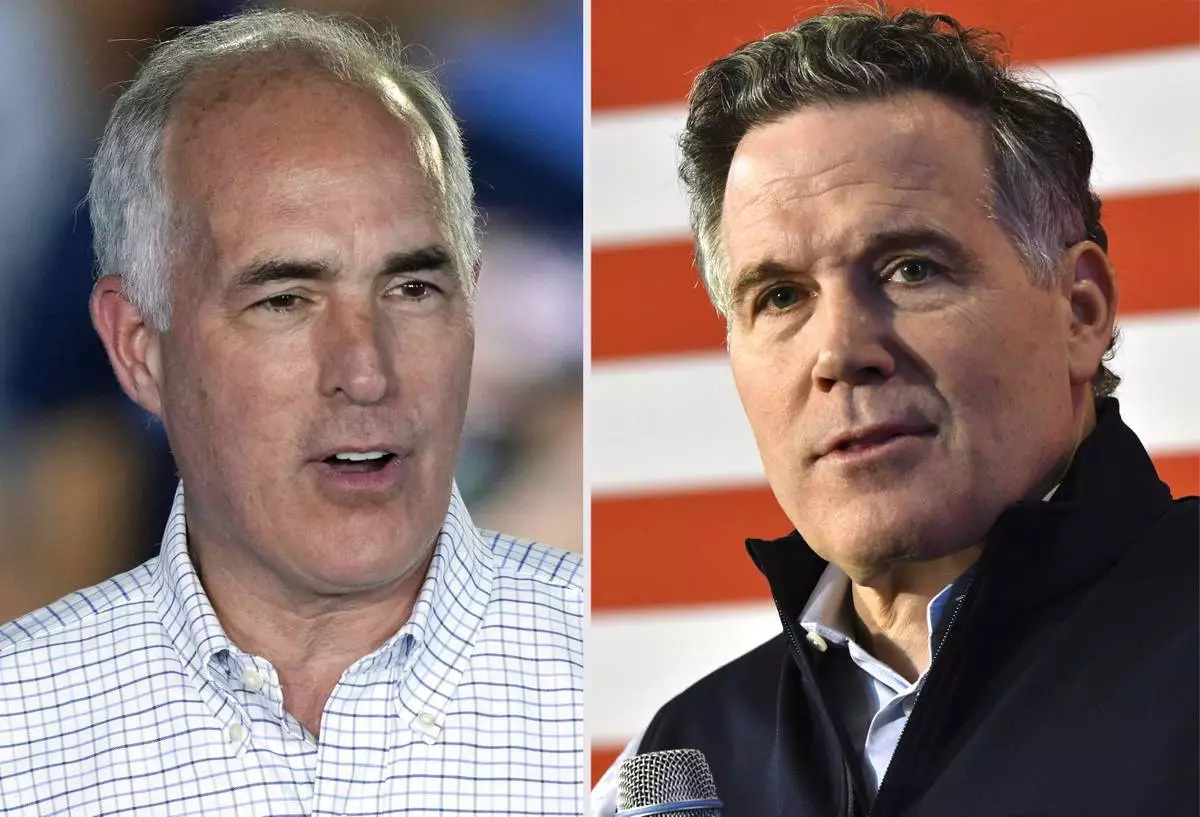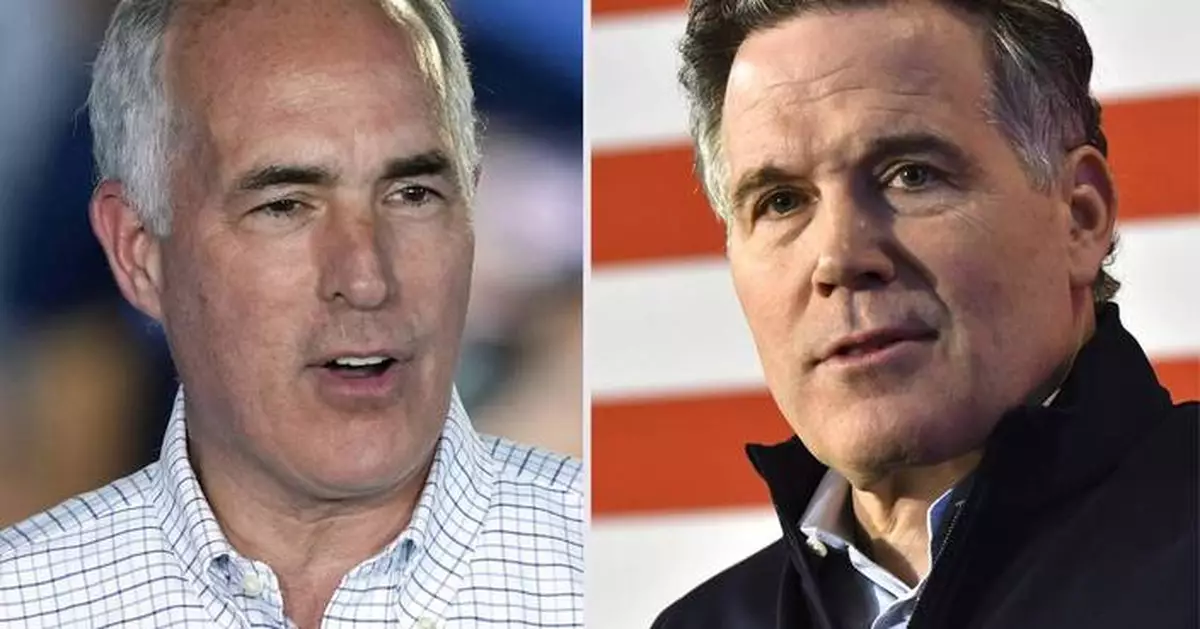HARRISBURG, Pa. (AP) — Before he ran for the U.S. Senate in Pennsylvania, David McCormick was a big name on Wall Street.
He was the CEO of the world's largest hedge fund, a world-traveled executive who was sought after for speaking engagements and prominent board positions.
His wealth and connections got him flagged by Republicans as someone who could both raise campaign cash and pay his own way for a Senate campaign.
But McCormick's Wall Street days haven't been such an asset of late. They provided grist for attacks by Republican primary rivals in McCormick's failed 2022 run for Senate and now by Democrats in his challenge to third-term Sen. Bob Casey.
Casey, in speeches and ads, hammers away at investments made by Bridgewater Associates while McCormick was CEO, including in Chinese companies that are considered part of Beijing's military and surveillance industrial complex.
“While I was fighting for union rights and fighting for working families in Pennsylvania, he was making a lot of money investing in China," Casey recently told a union crowd at a Teamsters hall in suburban Harrisburg. "He not only invested in Chinese companies, he invested in companies that built the Chinese military."
McCormick declined an interview request.
The need to fend off accusations that he profited at America’s expense comes at an unfortunate time for McCormick as China's relationship with Washington has grown increasingly tense.
But Bridgewater was hardly alone.
U.S. investment in Chinese companies surged while McCormick was Bridgewater’s CEO as hedge funds, institutional investors and fund managers plunged money into those same companies.
Some still do, according to a congressional report released this year after both the Trump and Biden administrations tried to block American investment in what they viewed as China's military and surveillance apparatus.
America's political community soured on China as early as 2016, but the U.S. financial sector “plowed right through that,” said Derek Scissors, a China specialist at the American Enterprise Institute in Washington who served on the U.S.-China Economic and Security Review Commission.
The economic ties extend beyond Wall Street. Semiconductor companies, farmers, tech and others in manufacturing rely on China for customers or components, Scissors said.
As Bridgewater’s CEO in 2019, McCormick described China as America’s “most defining bilateral relationship of our time,” even as calls began in Washington to block American investments in Chinese companies that could pose a threat to U.S. security.
As a candidate, McCormick has described China as an “existential” threat to the United States. He called for the federal government to develop a comprehensive strategy for America to outperform China economically and technologically, and said his experience with China means he can go “toe to toe” with its government on trade issues.
But McCormick also defends himself, both minimizing Bridgewater’s investments in China, saying it was 2% of the company’s assets, and describing investment in China as “unavoidable” because of client expectations and the rapid growth of that country's economy.
In a book he published last year, he wrote: “As is, U.S. dollars finance Communist China’s most egregious acts and ambitions.”
While campaigning, McCormick barely talks about his time at the hedge fund. If he mentions it at all, he tells audiences he ran a “financial firm” or an “investment firm.”
Instead, he dwells on other entries on his resume. Those include playing football and wrestling in high school, graduating from the U.S. military academy at West Point and serving with the Army in the first Gulf War, where he won a Bronze Star.
But if he is not talking up his Wall Street days, Wall Street does not seem to care. In his two campaigns for Senate, super political action committees that support McCormick have raised tens of millions of dollars and counting from the finance world.
McCormick, 59, earned a Ph.D from Princeton University, ran the online auction house FreeMarkets Inc., which had its name on a skyscraper in Pittsburgh during the tech boom, and served in senior positions in President George W. Bush’s administration.
There, he likes to say, he gained a reputation as a tough negotiator with the Chinese when tasked with Commerce Department policy over export controls of sensitive technologies.
When Bridgewater Associates hired McCormick in 2009 to be president, its founder, Ray Dalio, had a reputation for being bullish on China.
Today, Bridgewater is as prominent as any foreign investment firm in China.
Regulatory disclosures in China show that it has at least 10 billion renminbi — or at least $1.4 billion, and maybe much more — invested in Chinese assets there, said Harry Handley, a senior associate at Z-Ben Advisors, a financial advisory firm based in Shanghai.
That is the most of any foreign firm, Handley said.
McCormick, who was an executive at Bridgewater for 12 years, joined the company when investment banks, venture capital firms and hedge funds were fueling an investment boom in a growing Chinese economy.
“The Chinese economy was doing well for a long time and there was money to be made there,” said Greg Brown, a University of North Carolina at Chapel Hill professor of finance who researches hedge funds.
McCormick spent his last five years at Bridgewater as co-CEO or CEO, and those were big years for investing in China. That is when Chinese regulators relaxed restrictions over foreign investment in stocks and bonds, unleashing several years of particularly heavy investment, Brown and others say.
Bridgewater forged a reputation among foreign firms as an aggressive investor in Chinese companies — "over the past few years they’ve kind of dominated among the global firms in China," Handley said — and reputedly handled money for the Chinese government.
In early 2022, McCormick left Bridgewater to run for Senate in Pennsylvania in a seven-way GOP primary.
Bridgewater's connections with China followed him.
In one attack by a Republican primary rival, a video by Mehmet Oz 's campaign showed “finance bros” Chad and Tad at a bar when Tad asks Chad, “Do you think saying ‘I invest in China’ is a good pickup line?” Chad responds, “Investing in foreign adversaries always plays!”
At a rally days before the 2022 primary, former President Donald Trump, aiming to help Oz, his endorsed candidate, derided McCormick as having been with a company that “managed money for communist China."
McCormick lost narrowly to Oz.
This summer, Casey's campaign launched two ads that ran in Pennsylvania’s major TV markets attacking McCormick over Bridgewater's investments in companies tied to China’s military.
“Dave McCormick sold us out to make a fortune,” say hard-hatted speakers in one ad. “That’s the real Dave McCormick.”
McCormick has tried to tie Casey to China, saying Casey had money invested in Chinese companies through mutual funds and that the Casey-supported clean-energy policies of the Biden administration are making the U.S. more reliant on Chinese lithium batteries and solar panels.
Meanwhile, each candidate is trying to show that he is the tougher one on China. That has put the contrast between McCormick the CEO and McCormick the candidate into sharp relief, with McCormick explicitly calling for an end to U.S. investment in technologies in China that are critical to national security or tied to its military.
“McCormick has changed his tune because he’s a political type,” Scissors said. “If he was in the business community, he’d still be pushing for relations with China. Because that’s what they do.”
Follow Marc Levy at https://x.com/timelywriter.

This combination of photos taken in Pennsylvania shows Sen. Bob Casey, D-Pa., left, at a campaign event, Sept. 13, 2024, in Wilkes-Barre, and David McCormick, the Republican nominee for Senate in Pennsylvania, at a campaign event, April 25, 2024, in Harrisburg. (AP Photo)













